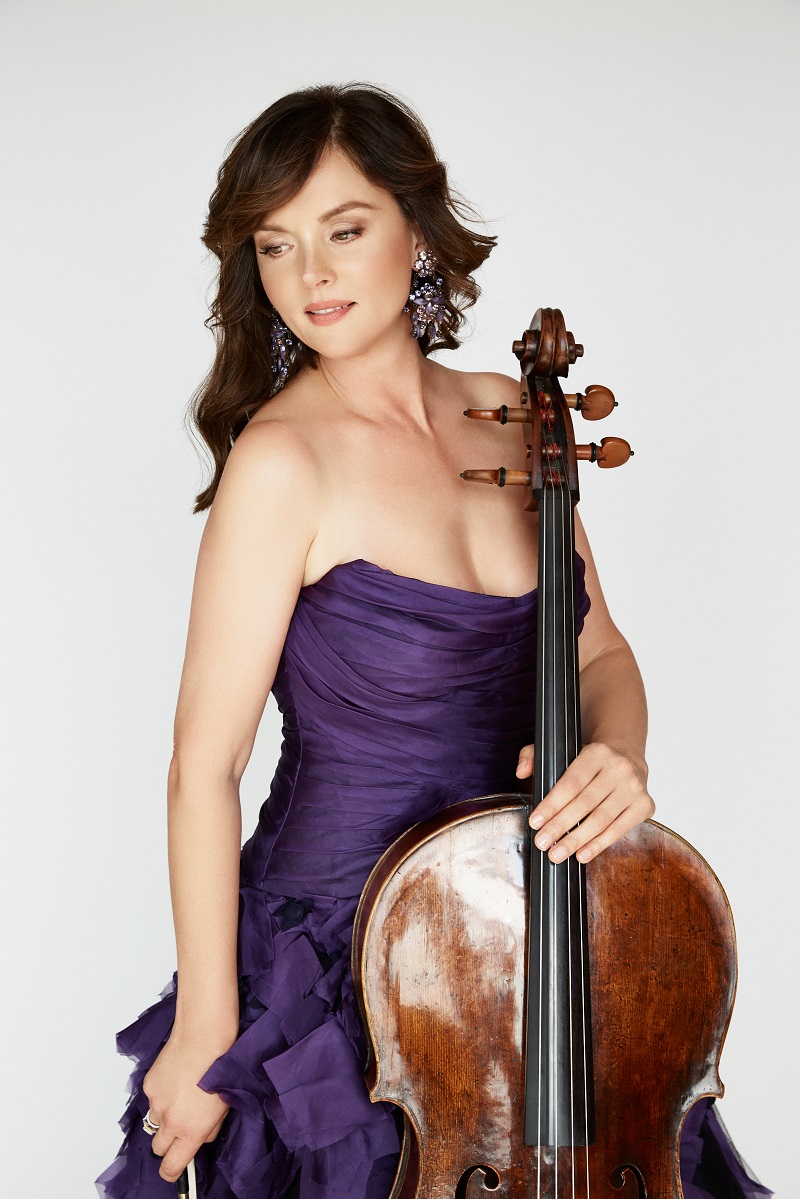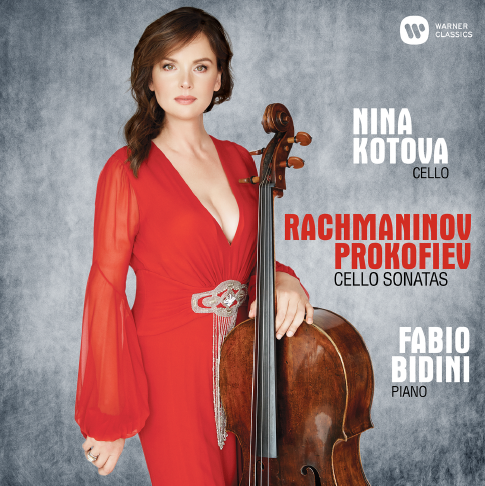
“it’s personal and passionate.” Nina Kotova of Russian music for Warner Classics
“Boundless enthusiasm…uncompromising virtuosity….smoldering intensity…”
The Russian-born cellist Nina Kotova established a base in the USA early in her career, but this second recording for Warner Classics comprises works that exemplify the musical soul of her native land Russia: Rachmaninov’s Sonata for Cello and Piano in G minor, which dates from 1901, and Prokofiev’s Sonata for Cello and Piano in C major, composed almost half a century later.
Kotova has been praised by Gramophone as “a strong and individual artist whose depth of feeling and technical control are never in doubt,” and who is notable for a “flexible expressive style, beautiful tone throughout the cello’s range, and an impressively dextrous, confident manner of delivery.” Newsweek has a described her as “a fantastically gifted cellist”, Time as “a musician of high seriousness and real talent” and the Los Angeles Times as “a talent to reckon with: poised, committed, graceful and spirited.”
Nina Kotova’s father was Ivan Kotov, a celebrated player of the double bass and a committed proponent of contemporary music in the Soviet Union. As a performer, Kotova is likewise an advocate of new music, and as a composer has herself produced a number of substantial works, including a cello concerto.
For this recording her partner is the Italian-born pianist Fabio Bidini, whose connection with the United States dates back to 1993, when he was a finalist in the Van Cliburn Competition. In addition to commanding a repertoire of more than 80 concertos, he is an eminent chamber musician and teacher.
The foundations of Nina Kotova’s career were set when, at the age of just seven, she became a student in the adult class at the Moscow Conservatory and went on to win First Prize at the Prague International Competition at the age of 15. She also studied in Cologne and at Yale. 1996 marked her London debut at Wigmore Hall and she has since performed at such venues as the Barbican Centre, Carnegie Hall, the Great Hall of the Moscow Conservatory, the Amsterdam Concertgebouw, the Forbidden City Concert Hall in Beijing, Osaka Symphony Hall in Japan, and even in Moscow’s famous Red Square. As a soloist she has played with orchestras around the world and at major festivals such as Verbier, Las Canarias and Tuscan Sun, of which she is co-founder and Artistic Director. Artists with whom she has collaborated include Lang Lang, Nikolaj Znaider, Hélène Grimaud, Joshua Bell, Sarah Chang, Bobby McFerrin, Ivry Gitlis, Antonio Pappano and the actor Jeremy Irons. The cello she plays on the recording is the 1673 Stradivarius that was previously in the possession of Jacqueline du Pré and then of Lynn Harrell.

Rachmaninov-Prokofiev: Cello Sonatas
For the casual fan of cello music, this nine piece set of Russian works for cello and piano may seem like far too much of a good thing. Nina Kotova’s sonata recording is anything but standard. For the dedicated fan of cello music, this set is right up to the level of the great performances of the past. For the deeply dedicated fan of Russian music, this set will be just the thing to fill out the corners in their collection.
The splendour of Russia’s ballet tradition is evoked in these spectacular scores interpreted by Nina Kotova for Warner Classics. The recording espouses modernism. Nina Kotova playing seems sensitive and introspective, and although it did not overwhelm me with tonal lushness, its direct, understated musicality had a certain appeal. Those qualities came through most clearly in a shapely, warm-toned rendering of Rachmaninoff’s Cello Sonata in G minor. This is an exciting undertaking, the percussive attack of the piano allowing almost no hiding place for even small lapses in ensemble.
These profound nine-track recording is inspiring, majestic to dance-like, reflecting the precise, articulate, spirited and expressive in a reserved, elegant manner. At its best, it’s personal and passionate. Boundless enthusiasm…uncompromising virtuosity….smoldering intensity…
The Sonata No. 2 in G Minor, Rachmaninov, Op.19 Allegro scherzando – proved quite personal for Kotova. Particularly in the opening passage, she expressed a deep sense of the music, albeit in a reserved manner.
Overall, this is very satisfying and fresh-sounding. For me, the opportunity to hear superbly played and deeply committed performances of these works by the accomplished Nina Kotova is an inducement enough to pick up the set and discover the bravura and excitement of Kotova’s performances.
By Heather M.

Music and Fashion Blogger










